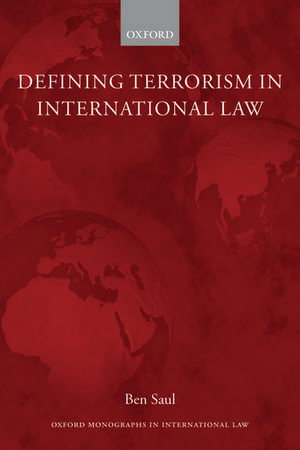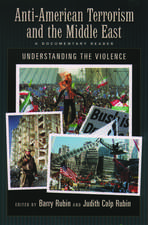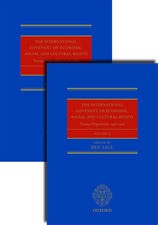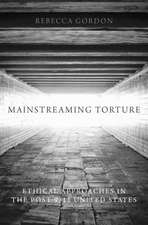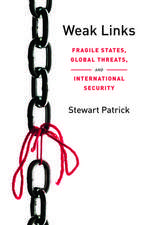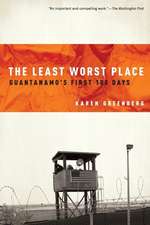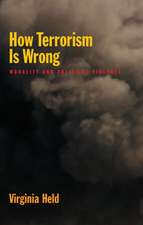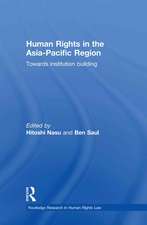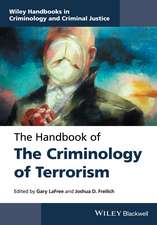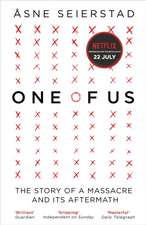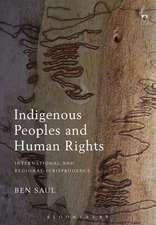Defining Terrorism in International Law: Oxford Monographs in International Law
Autor Ben Saulen Limba Engleză Paperback – 14 feb 2008
| Toate formatele și edițiile | Preț | Express |
|---|---|---|
| Paperback (1) | 385.62 lei 31-38 zile | |
| OUP OXFORD – 14 feb 2008 | 385.62 lei 31-38 zile | |
| Hardback (1) | 719.71 lei 31-38 zile | |
| OUP OXFORD – 31 aug 2006 | 719.71 lei 31-38 zile |
Din seria Oxford Monographs in International Law
- 19%
 Preț: 679.35 lei
Preț: 679.35 lei - 30%
 Preț: 658.92 lei
Preț: 658.92 lei - 21%
 Preț: 592.91 lei
Preț: 592.91 lei - 30%
 Preț: 539.57 lei
Preț: 539.57 lei - 26%
 Preț: 660.80 lei
Preț: 660.80 lei - 30%
 Preț: 663.08 lei
Preț: 663.08 lei - 21%
 Preț: 595.11 lei
Preț: 595.11 lei - 30%
 Preț: 658.59 lei
Preț: 658.59 lei - 27%
 Preț: 370.44 lei
Preț: 370.44 lei - 34%
 Preț: 1347.24 lei
Preț: 1347.24 lei - 27%
 Preț: 378.60 lei
Preț: 378.60 lei - 34%
 Preț: 1316.26 lei
Preț: 1316.26 lei - 34%
 Preț: 862.62 lei
Preț: 862.62 lei - 28%
 Preț: 485.50 lei
Preț: 485.50 lei - 18%
 Preț: 335.79 lei
Preț: 335.79 lei - 30%
 Preț: 600.85 lei
Preț: 600.85 lei - 16%
 Preț: 361.18 lei
Preț: 361.18 lei - 31%
 Preț: 401.15 lei
Preț: 401.15 lei - 34%
 Preț: 719.40 lei
Preț: 719.40 lei - 8%
 Preț: 425.80 lei
Preț: 425.80 lei - 30%
 Preț: 1145.50 lei
Preț: 1145.50 lei - 12%
 Preț: 472.49 lei
Preț: 472.49 lei - 30%
 Preț: 818.86 lei
Preț: 818.86 lei - 34%
 Preț: 603.33 lei
Preț: 603.33 lei - 28%
 Preț: 496.88 lei
Preț: 496.88 lei - 34%
 Preț: 970.38 lei
Preț: 970.38 lei - 19%
 Preț: 421.08 lei
Preț: 421.08 lei - 30%
 Preț: 887.10 lei
Preț: 887.10 lei - 18%
 Preț: 347.53 lei
Preț: 347.53 lei - 19%
 Preț: 345.83 lei
Preț: 345.83 lei - 27%
 Preț: 343.41 lei
Preț: 343.41 lei - 34%
 Preț: 719.71 lei
Preț: 719.71 lei - 31%
 Preț: 393.71 lei
Preț: 393.71 lei - 34%
 Preț: 1111.19 lei
Preț: 1111.19 lei - 33%
 Preț: 606.97 lei
Preț: 606.97 lei - 32%
 Preț: 471.96 lei
Preț: 471.96 lei - 27%
 Preț: 422.60 lei
Preț: 422.60 lei - 28%
 Preț: 418.39 lei
Preț: 418.39 lei - 30%
 Preț: 821.77 lei
Preț: 821.77 lei - 48%
 Preț: 467.95 lei
Preț: 467.95 lei - 18%
 Preț: 337.91 lei
Preț: 337.91 lei - 27%
 Preț: 598.45 lei
Preț: 598.45 lei - 30%
 Preț: 589.60 lei
Preț: 589.60 lei - 50%
 Preț: 834.70 lei
Preț: 834.70 lei - 30%
 Preț: 864.33 lei
Preț: 864.33 lei
Preț: 385.62 lei
Preț vechi: 529.19 lei
-27% Nou
Puncte Express: 578
Preț estimativ în valută:
73.79€ • 77.04$ • 61.07£
73.79€ • 77.04$ • 61.07£
Carte tipărită la comandă
Livrare economică 24-31 martie
Preluare comenzi: 021 569.72.76
Specificații
ISBN-13: 9780199535477
ISBN-10: 0199535477
Pagini: 416
Dimensiuni: 156 x 234 x 23 mm
Greutate: 0.64 kg
Editura: OUP OXFORD
Colecția OUP Oxford
Seria Oxford Monographs in International Law
Locul publicării:Oxford, United Kingdom
ISBN-10: 0199535477
Pagini: 416
Dimensiuni: 156 x 234 x 23 mm
Greutate: 0.64 kg
Editura: OUP OXFORD
Colecția OUP Oxford
Seria Oxford Monographs in International Law
Locul publicării:Oxford, United Kingdom
Recenzii
This book is a fine example of great scholarship. Saul provides the reader with many references to literature and philosophy, thereby opening up the reader's understanding of terrorism and international law more generally. Undoubtedly, this book deserves to be called 'seminal', for there are no other works that provide such an in-depth examination and analysis of the concept of terrorism.
a study that is highly impressive in its comprehensiveness and depth of analysis. It is this balanced approach and detail of analysis that make this study so valuable and that will undoubtedly establish it as the essential starting point for any further attempts to define terrorism in international law.
This book is immediately recognizable for its thoroughness in research and meticulousness in detail. the usefulness of the book in the overall development of a coherent legal framework for fighting terrorism is assured.
Ben Saul's book is an exceptional study of the issue. Despite the fact that many scholars have written extensively on terrorism, this book is exemplary of fine scholarship and deserves a wide readership. Saul's book is erudite, clear, and informative without being turgid. The author makes interesting and stimulating points, thus opening up the reader's horizons to further reflect on the issue. The arguments employed are strengthened by extensive empirical research. Given the persistent disagreement about defining terrorism over many years this book is highly educative.
He deftly addresses one of the trickiest issues in defining terrorism - how to treat asymmetric warfare in self-determination movements. It is quite thorough in its detail making the monograph useful as a reference text. Throughout the monograph, Saul maintains an even-handed tone - even when discussing potentially inflammatory matters such as the Israeli-Palestinian conflict. Saul's monograph lays out a strong case for addressing terrorism on the international level as a crime and presents a coherent framework for doing so. a good start toward making international law relevant to post-9/11 terrorism.
One can recommend this book to everyone interested in the problematic of terrorism.
the book provides a sophisticated study of the definition of terrorism in international law. It is a comprehensive and important contribution to the existing literature.
a study that is highly impressive in its comprehensiveness and depth of analysis. It is this balanced approach and detail of analysis that make this study so valuable and that will undoubtedly establish it as the essential starting point for any further attempts to define terrorism in international law.
This book is immediately recognizable for its thoroughness in research and meticulousness in detail. the usefulness of the book in the overall development of a coherent legal framework for fighting terrorism is assured.
Ben Saul's book is an exceptional study of the issue. Despite the fact that many scholars have written extensively on terrorism, this book is exemplary of fine scholarship and deserves a wide readership. Saul's book is erudite, clear, and informative without being turgid. The author makes interesting and stimulating points, thus opening up the reader's horizons to further reflect on the issue. The arguments employed are strengthened by extensive empirical research. Given the persistent disagreement about defining terrorism over many years this book is highly educative.
He deftly addresses one of the trickiest issues in defining terrorism - how to treat asymmetric warfare in self-determination movements. It is quite thorough in its detail making the monograph useful as a reference text. Throughout the monograph, Saul maintains an even-handed tone - even when discussing potentially inflammatory matters such as the Israeli-Palestinian conflict. Saul's monograph lays out a strong case for addressing terrorism on the international level as a crime and presents a coherent framework for doing so. a good start toward making international law relevant to post-9/11 terrorism.
One can recommend this book to everyone interested in the problematic of terrorism.
the book provides a sophisticated study of the definition of terrorism in international law. It is a comprehensive and important contribution to the existing literature.
Notă biografică
Ben Saul is a Director of the Sydney Centre for International Law at the Faculty of Law, University of Sydney. He was previously a Senior Lecturer at the University of Sydney
